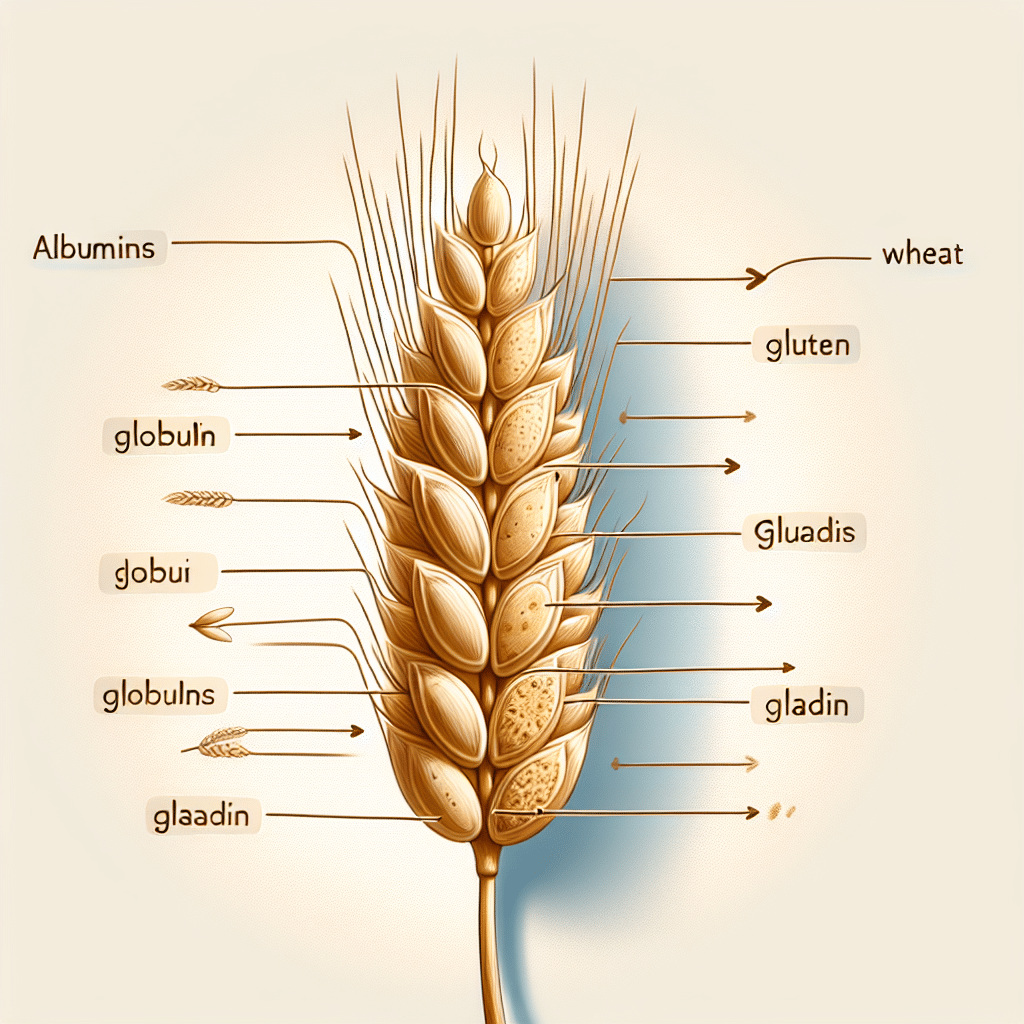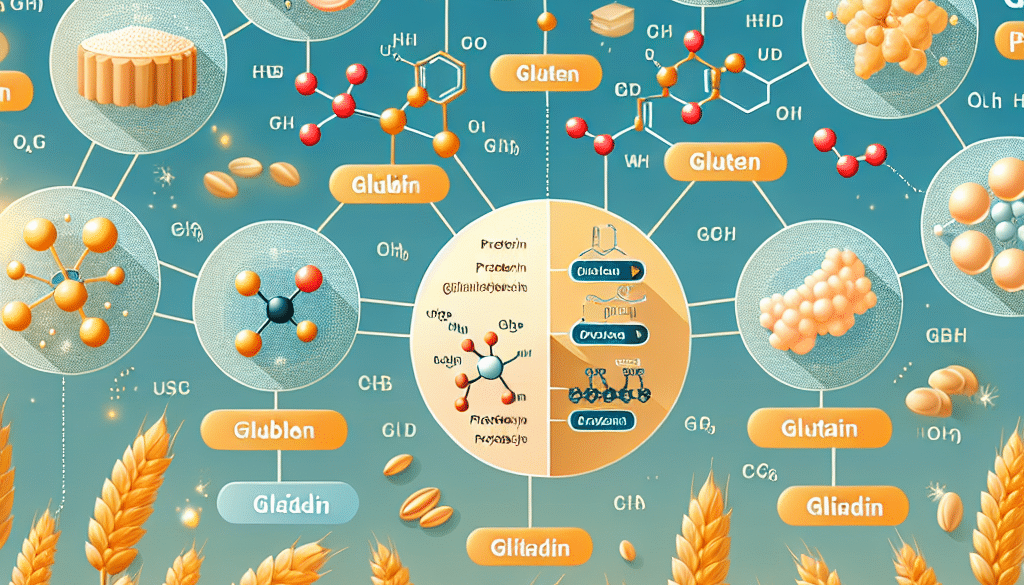What Proteins Are In Wheat Besides Gluten?
-
Table of Contents
- Exploring the Diversity of Wheat Proteins Beyond Gluten
- Understanding Wheat Proteins Beyond Gluten
- Albumins and Globulins: The Water-Soluble Proteins
- Prolamins and Glutelins: The Storage Proteins
- Nutritional Implications of Non-Gluten Proteins in Wheat
- Functional Properties of Wheat Proteins in Food Applications
- Case Studies and Statistics: The Impact of Non-Gluten Wheat Proteins
- Conclusion: The Significance of Wheat’s Protein Diversity
- Discover ETprotein’s Range of Protein Products
Exploring the Diversity of Wheat Proteins Beyond Gluten

Wheat is a staple food for a significant portion of the world’s population, providing essential nutrients and serving as a primary source of calories. While gluten, a protein composite found in wheat and related grains, is often the most discussed protein due to its implications for individuals with gluten-related disorders, wheat contains a multitude of other proteins that play crucial roles in nutrition, baking properties, and plant physiology. This article delves into the various proteins present in wheat besides gluten, their functions, and their potential benefits and applications.
Understanding Wheat Proteins Beyond Gluten
Gluten is a well-known protein in wheat that provides the elasticity and structure in dough that is essential for bread-making. However, wheat proteins are diverse and can be categorized into several groups based on their solubility and functionality. These proteins are not only vital for the plant’s growth and development but also have significant nutritional and functional implications for human consumption.
Albumins and Globulins: The Water-Soluble Proteins
Albumins and globulins are two types of water-soluble proteins found in wheat. They are easily extractable in water or saline solutions and are not involved in the bread-making process. However, they are important for their enzymatic activities and nutritional value.
- Albumins: These proteins include enzymes such as amylases, which break down starches during germination and seedling growth, and protease inhibitors, which play a role in plant defense mechanisms.
- Globulins: Globulins are primarily storage proteins that serve as a nitrogen source for the germinating seed. They include enzymes and enzyme inhibitors that are crucial for plant metabolism and defense.
Prolamins and Glutelins: The Storage Proteins
While gluten is composed of gliadins (prolamins) and glutenins (glutelins), wheat also contains other prolamins and glutelins that are not part of the gluten complex.
- Prolamins: Besides gliadins, wheat contains other prolamins such as avenins, which are similar to those found in oats. These proteins are rich in proline and glutamine amino acids.
- Glutelins: Apart from glutenins, wheat glutelins include proteins that are less involved in the bread-making quality but contribute to the overall protein content and nutritional profile of wheat.
Nutritional Implications of Non-Gluten Proteins in Wheat
Non-gluten proteins in wheat contribute to the overall nutritional value of wheat-based products. They provide essential amino acids that are necessary for human health, and their presence can affect the digestibility and allergenic potential of wheat.
- Essential Amino Acids: Albumins and globulins are particularly rich in lysine, an essential amino acid often limited in cereal grains. This makes them valuable for improving the amino acid balance in wheat-based diets.
- Digestibility: The digestibility of wheat proteins can vary, with albumins and globulins generally being more digestible than prolamins and glutelins. This is important for populations relying heavily on wheat for protein intake.
- Allergenic Potential: While gluten is the primary concern for individuals with celiac disease, other wheat proteins can also be allergenic. For example, wheat-dependent exercise-induced anaphylaxis (WDEIA) is often associated with omega-5 gliadins, a type of prolamin.
Functional Properties of Wheat Proteins in Food Applications
The functional properties of wheat proteins, including water absorption, emulsification, and foaming, are essential for various food applications beyond bread-making.
- Emulsification: Albumins and globulins can act as emulsifiers, stabilizing oil-in-water mixtures, which is beneficial in products like salad dressings and mayonnaise.
- Foaming: The ability of wheat proteins to create and stabilize foams is useful in products such as meringues and whipped toppings.
- Texture Modification: Non-gluten proteins can also affect the texture of food products, contributing to the firmness or tenderness of baked goods.
Case Studies and Statistics: The Impact of Non-Gluten Wheat Proteins
Research has shown that the manipulation of non-gluten proteins in wheat can have significant effects on the nutritional and functional properties of wheat-based foods. For example, studies have focused on increasing the lysine content of wheat through breeding and genetic modification to improve its nutritional value. Additionally, the extraction and utilization of wheat albumins and globulins in food formulations have been explored to enhance the functional properties of food products.
Statistics from agricultural and food science research indicate that the protein composition of wheat can vary significantly depending on the wheat variety, growing conditions, and processing methods. This variability can affect the quality and nutritional profile of wheat-based products, highlighting the importance of understanding and optimizing the content of non-gluten proteins in wheat.
Conclusion: The Significance of Wheat’s Protein Diversity
In conclusion, wheat’s protein content extends far beyond gluten, encompassing a variety of albumins, globulins, prolamins, and glutelins that contribute to its nutritional value and functional properties. Understanding these proteins is crucial for addressing dietary needs, managing allergies, and improving the quality of wheat-based foods. As research continues to uncover the roles and potential applications of these proteins, the versatility of wheat as a food source is further emphasized.
Discover ETprotein’s Range of Protein Products
If you’re interested in exploring a diverse array of protein options, ETprotein offers a wide selection of high-quality protein products. Their offerings include organic rice protein, clear rice protein, pea protein, clear pea protein, and various seed proteins such as watermelon, pumpkin, and sunflower. ETprotein’s products are characterized by a neutral taste, non-GMO, and allergen-free attributes, making them suitable for a range of industries including nutraceuticals, pharmaceuticals, and food and beverage.
For those seeking specialized protein powders and nutritional supplements, ETprotein provides tailor-made solutions to meet your specific needs. With a commitment to quality and customer satisfaction, ETprotein is a trusted supplier for leading global brands. To learn more about their products or to request a sample, contact ETprotein at sales(at)ETprotein.com.
About ETprotein:
ETprotein, a reputable protein and L-(+)-Ergothioneine (EGT) Chinese factory manufacturer and supplier, is renowned for producing, stocking, exporting, and delivering the highest quality organic bulk vegan proteins and L-(+)-Ergothioneine. They include Organic rice protein, clear rice protein, pea protein, clear pea protein, watermelon seed protein, pumpkin seed protein, sunflower seed protein, mung bean protein, peanut protein, and L-(+)-Ergothioneine EGT Pharmaceutical grade, L-(+)-Ergothioneine EGT food grade, L-(+)-Ergothioneine EGT cosmetic grade, L-(+)-Ergothioneine EGT reference grade and L-(+)-Ergothioneine EGT standard. Their offerings, characterized by a neutral taste, non-GMO, allergen-free attributes, with L-(+)-Ergothioneine purity over 98%, 99%, cater to a diverse range of industries. They serve nutraceutical, pharmaceutical, cosmeceutical, veterinary, as well as food and beverage finished product distributors, traders, and manufacturers across Europe, USA, Canada, Australia, Thailand, Japan, Korea, Brazil, and Chile, among others.
ETprotein specialization includes exporting and delivering tailor-made protein powder and finished nutritional supplements. Their extensive product range covers sectors like Food and Beverage, Sports Nutrition, Weight Management, Dietary Supplements, Health and Wellness Products, and Infant Formula, ensuring comprehensive solutions to meet all your protein needs.
As a trusted company by leading global food and beverage brands and Fortune 500 companies, ETprotein reinforces China’s reputation in the global arena. For more information or to sample their products, please contact them and email sales(at)ETprotein.com today.












